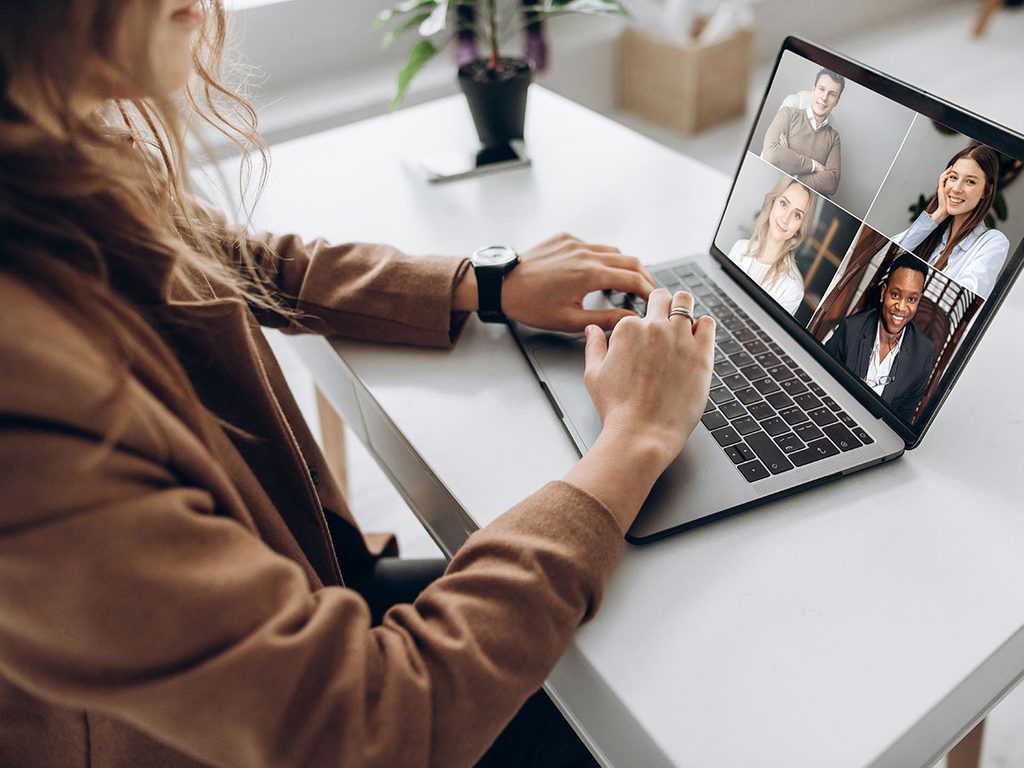Zoom Burnout Is Real—Here Are 7 Therapist Tips For Making Hangouts Better

Weekly Zoom meetings seemed great at first—and then they suddenly became a hassle. We asked experts how to make Zoom fun again.
When stay-at-home orders were first announced, my friends and I enthusiastically put weekly Zoom meetings on the calendar. I had a few set up with different groups of people. At the time, it seemed like a genius idea to make sure we had plans to check-in and “hang out” at least once a week. But by May, all of the Zooms started to feel more like chores than welcome social events.
You know those moments when no one has anything to say and everyone is staring at the screen smiling silently for a few beats too long? Or how about when you’re ready to log out but are afraid to interrupt the person talking to announce your departure? They never seemed to get easier to navigate. Feeling like I had to be “on” every time my camera lit up started to get old.
Zoom hangouts can lead to burnout
I’m not alone—my friends and I started to go a few weeks without any Zooms. Some of us dared to say it: “I’m just sick of video chats and need a week off.” Weekly digital hangouts officially weren’t fun anymore—they were overwhelming. They were exhausting. We had all reached the point of Zoom burnout.
The thing is, Zoom (and Google Hangouts, Houseparty, FaceTime, or whatever video program you use) isn’t going away anytime soon. Travel restrictions are still in place throughout our country, and even when they’re not, it’s going to take some time for us to feel comfortable visiting friends and family who live far away. This all means that we’ll still be relying on video conferencing to communicate with distant friends and loved ones for the foreseeable future. So, I spoke with a couple of mental health experts to find out why Zoom burnout is happening and how we can keep staying in touch with people without feeling absolutely overwhelmed.
Video calls can send the brain into overdrive
Zoom hangouts with big groups of people are tiring because they cause cognitive overload, explains Babita Spinelli, a licensed psychotherapist and psychoanalyst in private practice in New York City and Northern New Jersey. “Unlike being in person, when we’re doing a Zoom with a group or individuals, we’re much more aware of what is happening with each person on the video call,” she says. We don’t realize it, but our brains essentially go into overdrive trying to pick up social cues from every face on the screen. “That wouldn’t necessarily happen in person,” Spinelli says. Even if you’re at a party, chances are you’re only talking to a couple of people at a time versus the entire room.
Not only are our brains trying to focus on a million things at once, but there isn’t anything very good for them to focus on, says Jessi Gold, MD, assistant professor in the department of psychiatry at Washington University in St. Louis. “We can only see the eyes or half a face, and we can’t pick up any good body language cues either,” Dr. Gold says. The videos are small and sometimes the connection isn’t great, it’s blurry. There are background noises and movements. Our eyes dart around from one person to another. We subconsciously try to read other people and pick up emotional and social cues, but it’s way harder. That’s mentally draining.
Video calls can induce anxiety
The very nature of Zoom gives us more to be anxious about. First and foremost, they make us very aware of the way we look, says Spinelli. Being able to see yourself on the screen as you talk is not something we do in real life. “It’s like looking at yourself in the mirror the entire time you’re socializing,” Spinelli says. This forces us to constantly think about how we look and what our facial expressions are revealing. For anyone with a little bit of social anxiety to begin with, this pressure to perform and constantly overthinking oneself is extra exhausting.
And then there’s the anxiety that imperfect Internet connections can cause. “If you want to just relax and socialize with friends, you don’t want to have to think about if the Internet is going to work,” says Dr. Gold. This unknown when it comes to technology is even more stressful during work video conferences, which you need to be at, she says. “There’s this unknown component and we don’t love unknowns.”
Finally, Zoom calls are a stark reminder of what’s happening around us. “They’re constant reminders of the pandemic,” says Spinelli. “You’re very aware, even if you’re not talking about it. Every video call that’s happening can be a subconscious reminder that this isn’t normal life.” That makes us sad and anxious and when we have those symptoms, we feel tired, Spinelli explains.
How to fight off Zoom burnout
While video chats aren’t perfect, they’re better than no social interaction at all. But that doesn’t mean you have to keep doing them in a way that leaves you feeling uneasy and mentally exhausted. Try implementing the following tactics to make digital hangouts more enjoyable.
Be honest
If you’re sick of Zoom meetings, speak up. Chances are, you’re not alone. “Someone has to start that conversation otherwise everyone is going to just keep doing it because they’re supposed to,” Dr. Gold says. Remember: Your friends can’t read your mind. You have to tell them what you’re feeling.
Establish boundaries
It’s perfectly OK to skip a weekly Zoom and let your friends or family know that you’re just not feeling up to it this time. The key here is to be in touch with how depleted you are and set a boundary, Spinelli says. The same goes for leaving “early,” whatever that means. You don’t need a concrete reason to exit a never-ending video hangout. Say you have to go and end on a positive note, Spinelli suggests, with something like “it was great talking with you.” Do what’s best for you, and don’t feel bad about it.
Set a time limit
Speaking of never-ending video hangouts: Put an end to them before they start. Spinelli suggests scheduling videos for 30 minutes max. It’s enough to feel relaxed and connected, but not too long that you’ll end up drained.
If you’re not the person scheduling the meeting, make it clear that you have to log off by a specific time. “Say it out loud and mean it,” says Dr. Gold. “Life is really complicated right now and I think people get it.”
Suggest phone calls instead
Remember phone calls? Where you just speak to someone and have a conversation, without having to turn on a video camera? They’re still a perfectly valid option. “Even just having phone calls with people will feel nice, you’re still connecting,” says Dr. Gold. If you’re on the phone, you can also get up and go for a walk (it’ll boost your mood) to get some fresh air, which will be a much-needed break if you’ve been sitting at your computer most of the day.
Opt for one-on-one time when you can
Spinelli suggests scheduling individual videos (or just calls) for when you’re planning to do other stuff, like having coffee in the morning or sitting down to have a glass of wine on Friday night. That way, you can stay in touch and have meaningful conversations without the pressure that comes with a huge group Zoom. Just make sure to set boundaries and recognize how much is enough for one week or day—back-to-back individual calls are overwhelming in their own way.
Plan a structured activity
Planning an activity or game over Zoom can relieve some of the pressure of having a conversation, making the call more enjoyable and less exhausting, says Spinelli. It also eliminates the anxiety we feel when we’re fishing for something to say—when literally nothing is new or noteworthy. Plan a movie viewing party or cooking class, take a lesson together, do a virtual tour of another country, play a game, or take the same yoga class. All of these can help foster a sense of connection without it being all about the conversation.
Replenish with alone time
“There are lots of ways to replenish to give yourself more energy if you want to continue to have these kinds of connections but you’re feeling tired,” says Spinelli. Have you given yourself enough alone time? Are you using that time to focus on self-care? A lot of people have been getting more alone time than they could ever dream of, but it’s important to make sure you’re doing things that replenish your energy during those times, says Spinelli.
A tech-focused social life can be a positive force (in a world full of collective trauma) if you manage it properly, says Spinelli. “When we can manage and understand it, we can still have the connection and joy and activity we’re looking for.” The first step is checking in on yourself and recognizing when you’re in emotional overdrive and need a healthy break.







